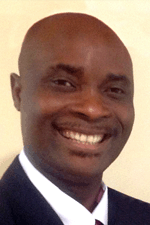The Uncommon Call

Augustin Bocco, PhD
Assistant Professor of French and Francophone Literature
Tennessee Wesleyan College
On numerous occasions, we see on our university campuses very brilliant young men and women who decide to quit their studies and drop out of school because they feel the call to ministry. There is no doubt among believers today that apostles, pastors, evangelists, youth directors, children’s workers, women’s ministry leaders, etc., are called of God to the work of the Kingdom. In this line of reasoning, it is also fair to say that the notion of calling in the Church today is becoming more and more limited in the mind of the majority of Christians, as many of them have the tendency to solely tie the concept of “calling” to the spiritual life. It is in this perspective that Terry Cross affirms, “In my 40 years of being cognizant of the Pentecostal Movement, I never heard anyone speak of their ‘non-clergy’ career as a calling.”[1]
According to Robert Berg, Cross’s statement is consistent with the common Pentecostal usage over the past century which has indicated the belief that a special “call” beyond that of salvation is given to certain believers to enter “full-time ministry,” understood to consist of the offices of pastor, evangelist, or missionary.[2] However, if the Christian world today agrees with this belief that only pastors, missionaries, evangelists, youth leaders, etc., are called, then what about the rest of the children of God, who are lawyers, school teachers, medical doctors, janitors, politicians, businessmen or businesswomen, mechanics, translators, computer engineers, carpenters, construction workers, and the like? Does not God call these precious saints to their respective careers as well? Does God only call people to “spiritual ministry?”
While the primary call in the Bible, both in the Old and New Testament is a call from God to His people to repentance (Leviticus 3:14), to special duties (Isaiah 42:6), to follow Him (cases of Matthew, Peter, James), and to have a relationship with Him, God also calls us to fulfill his purposes by serving the community around us and humankind in general. Thus, according to Berg:
Our second call is to serve other people. Each person has certain gifts, talents, and abilities, which may find expression in any number of career paths in business, service agencies, education, government, or the church. These gifts are not bestowed upon us merely for our own gratification or privilege. Having them creates obligations to serve both the community of faith and the human community at large.[3]
Moreover, whether pastor, missionary, or other, God states, “. . . we are His workmanship, created in Christ Jesus to good works, which God has before ordained that we should walk in them” (Ephesians 2:10). The significance of this truth is key for the twenty-first century church, because it will challenge her to rethink her strategy for a greater impact in our world today. The twenty-first century church must know and understand that the mission field today is not only in Togo and Texas where we need to train leaders and plant churches, but also in our schools and universities where billions of young minds need to be prepared to take on the world in our hospitals, schools, mechanic shops, doctor’s offices, government, etc. In other words, the ministry is also our everyday jobs, and the less popular truth must be told: As much as the church needs pastors, youth directors, and church planters today, not everyone is called to be one. Everyone may have a ministry, but not everyone is called to be in clergy ministry. That’s why members of the young generation not called to clergy ministry, but may be a bit confused, should not be forced into it, and must be redirected to embrace the ministry that God has entrusted to them as lawyers, medical doctors, computer engineers, senators, businessmen, etc.
When I came to the United States in 2000, I already knew I wanted to become a professor of language and literature, even though the path to attaining this goal was not even close to where I was at that moment. I must admit that my first years in the United States felt like I was in the wilderness with no way out. I had very little to no English skill and I was 27 years old. Even though I was only one semester away from a bachelor’s degree when I left Togo, because I spoke no English, I knew that I would have to start again from the beginning. I began my first job at a local car wash in Cleveland where I learned some English. After a few months at the car wash, I was hired at the Church of God of Prophecy International Offices as a French translator. Though I had a new job that was much better than the first, and in some way in the vicinity of what I wanted to do, I knew I still had not reached my goal. I was convinced that my dream and passion to teach was my calling and I started looking for ways to make this a reality. Through a multitude of counselors, I came to the realization that I had to pursue higher education.
My journey began with evening classes at the local community college, which took a total of four years to earn an associate’s degree. After my graduation in spring 2005, I was accepted on scholarship to Lee University. At Lee, I took 12 to15 credit hours each semester while still holding my 40 hours a week job as translator. Three and a half years later, I graduated from Lee University and was accepted into the graduate program at the University of Tennessee, Knoxville (UTK). At UTK, the challenge was even greater. In addition to my full-time job as translator, I commuted 180 miles each day, five days a week for five and a half years to earn a Master’s and a PhD in French and Francophone Studies.
One thing I learned through this journey is the constant redirection toward my calling. I went through times in my life when I asked myself over and over again: “Why such a strong dream and passion to be a professor while thousands of people are perishing? Is this the right thing to do? I know I have the gift to teach in my local church, to lead the youth, and opportunities to share the Word of God, so why shouldn’t I take this straight to the field?” I must admit that sometimes I felt like only people in clergy ministry were the ones doing the most important work, the work that matters the most to God.
Thankfully, today, I can tell the reason of such a strong passion and even the wrestling that I felt within. My PhD in French and Francophone Studies has opened the door for me be a professor teaching French language and literature with a Christian perspective. Every single student that I have the opportunity to teach understands that language is a gift from God and serves in that matter as a powerful tool to reach other people who may not look like us but may be attracted to us because we speak their language. And, in speaking it so well, we will be able to witness to them.
This also translates to my work at the International Offices. I also understand that I had a strong passion to earn the highest degree so that the work I do for the Church will be done in a professional manner. When an article in the White Wing Messenger is translated into French, it becomes a piece of art created with such skill that only a professional of similar stature can produce. When I translate words, I do it with people’s heart and spirit in mind.
Education and calling, in clergy work or not, should complement each other. The young generation must be encouraged that, in order to fulfill their vocation, they do not necessarily have to drop out of school. Pursuing higher education should be an asset and not a liability for one’s ministry whether in clergy or secular world. Higher education has been indispensable to the realization and expression of my calling.
[1] Terry Cross, Answering the Call, Pentecostal Reflections of a Theology of Vocation, Work, and Life, Lee University Press, 2007, p. 22.
[2] Robert Berg, “Calling: A View from a Pentecostal Liberal Arts University,” Evangel University, p.15.
[3] Project Mission Envision brochure, p.2, citing Robert Berg in “Calling: A View from a Pentecostal Liberal Arts University”

